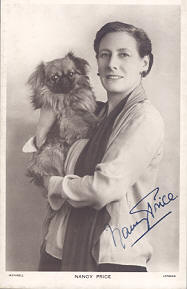Nancy Price, the FIS and a Troll at the Seaside December 21, 2012
Author: Beach Combing | in : Contemporary , trackbackNancy Price was an English actress who was famous in her day and yet is now all but forgotten: thespians suffer that fate. NP interests Beach because, in the 1950s, she was a member of the Fairy Investigation Society. You would have thought that anyone who would care to get involved in such an unfashionable outfit would have had strong fairy views: well, not necessarily or at least not strongly expressed fairy views. In fact, NP wrote a score of books ranging from autobiographies to essays with a strong accent on the countryside, but Beach has found relatively little fairy fodder so far. True as a young girl she peopled (in an imaginary fashion) the landscape of her home with fairies. She also, aged eight, went for country walks with Sabine Baring-Gould who told her tales about fairies and witches. But Beach has not found a fairy sighting: can anyone put this right? drbeachcombing AT yahoo DOT com A Nancy Price archive has some fairy stuff but nothing interesting: quotations from Lewis Carroll etc. etc.
NP did have psychic beliefs. She claimed that she had encountered ghosts on a number of occasions, ghosts that she believed were echoes of previous times rather than spirits. She also had a peculiar experience as a young girl in Worcestershire when ‘a naked man covered with blood jumped through the tall hedge immediately in the path of my spirited cobb’. It has happened to us all, Nancy… She whipped her horse on and escaped.
In the quarter or so of her canon that we’ve examined to date the closest we come to fairies is a troll. Our heroine was at Grange over Sands in Cumbria, a town she eulogises. However, while sitting on the end of the promenade she saw a peculiar being. She describes this all very matter of factly.
I was sunning myself on the seat at the end of the little promenade when she walked slowly past me. Her black eyes had a rapier-like dart – they pierced. She was hideous, short, thick-set. She had a pale, yellowish face, and around it grew a black growth of hair like a Newgate frill. She could easily have shave it, but probably on some lonely hillside this was the vogue. She wore a hideous mustard-coloured garment which had no particularly shape. She had large hands and carried a stick. I knew at once that here was a troll. Her face was cruel and powerful. She possessed a certain dignity. I felt sure she was a troll of repute. Heaven knows what had brought her down from her hills. I should never have seen her save that she stayed a short time looking out to sea over those miles of amazing sand where hundreds of gulls were sporting themselves. I should never have known her for what she was had she not turned and looked at me for a few moments; those moments seemed hours, her eyes fastened upon me with steel rivets. My head began to swim and swell; I felt it was only a matter of time before she would possess my soul, yet I was helpless to prevent it. My dog growled and lowered his tail. She took a step towards me, and he gave vent to a defiant snarl; leaping on to my lap he faced the troll, his little teeth gleaming. The troll’s face relaxed; I could not say that she smiled, but something in the nature of amusement seized her, then her eyes left me and she passed on. I never saw her again, but I am quite sure that she is even now taking part in some evil rite in the dark shadows of the wild hills. (1935)
In five hundred years when historians cite this they’ll argue about what satirical lunges were behind this description: what did our authoress really mean by ‘troll’. We who live just eighty years after know better. Mrs P believed herself to be a ‘sensitive’, though Beach has a strong suspicion that she had just come face to face with the local wino and her dog could smell the meths.
On a final random note Beach found a curious annotation in one of Nancy Price’s books. In Nettles and Docks (great name) her preface was written by Norman Birkett who describes the author as ‘a fighter on the side of all things which are honourable and true and of good report amongst men’. The first reader of this book, who went by the nickname Scoops put a single exclamation mark next to the sentence. In the 1940s there was still the unfair idea that any woman in the theatre…



